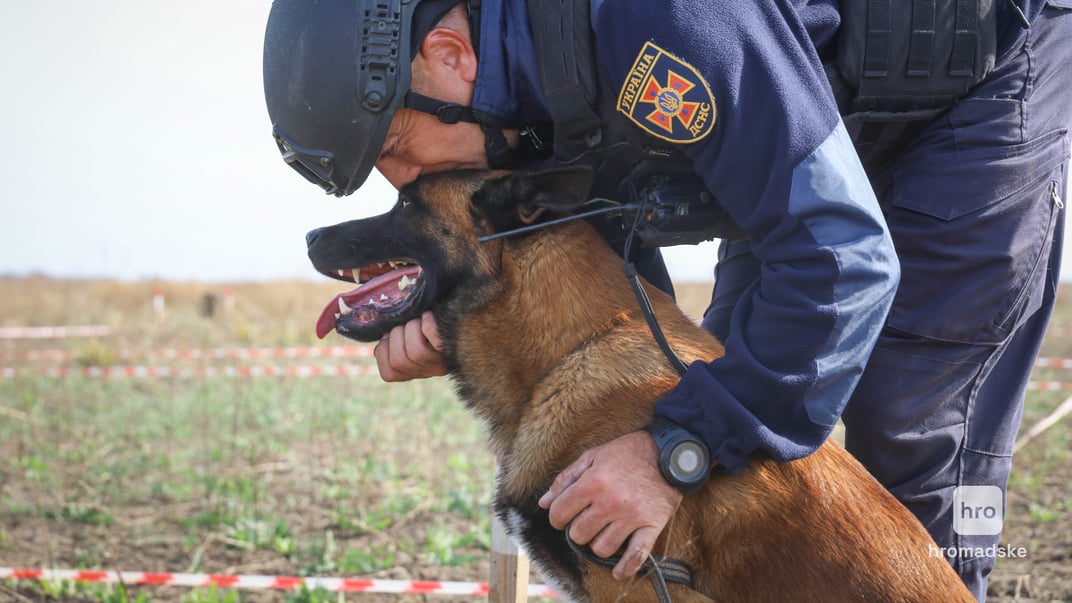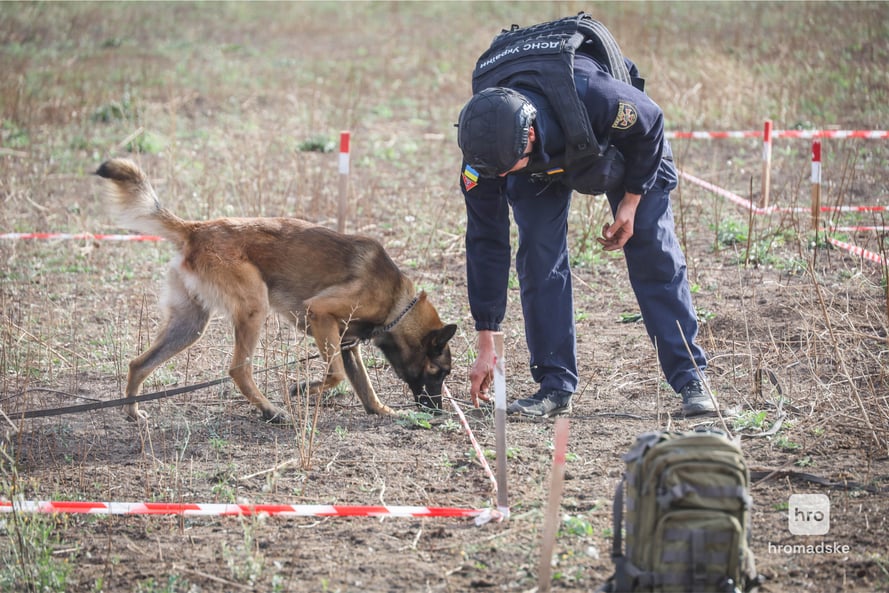"Comsec"! Why do mine detection dogs working in Ukraine understand Bosnian?


The Dog Detects Explosives in Plastic
The field is located 50 km from the regional center. Two years ago, intense fighting took place here. We have just passed the villages of Pervomaiske and Kyseliovka, which were specifically targeted by Russian artillery. They are in ruins. There are no fences, roofs, or walls that have not been destroyed by shells. Only piles of construction debris remain where the school and club used to be. In a few yards, some are restoring or noticeably replacing roofs.
When the Russians retreated in the autumn of 2022, they left "gifts" everywhere. Sappers found explosives even in children's cribs and dog houses.
“Since the start of the full-scale invasion by Russia, pyrotechnic units in our region have been called out 9,287 times. They have discovered and destroyed around 26,000 explosive devices,” says Artem Vagin, Deputy Head of the Main Department of the State Emergency Service of Ukraine in Mykolaiv region.
The fields in Mykolaiv region are also littered with explosives. This year, sappers were supposed to clear 1,790 hectares. By the end of September, they were nearly finished. Local teams are assisted by colleagues from Zaporizhzhia, Chernivtsi, Odesa, and Sumy regions. Some work with robots, while others manually search with metal detectors. There is also a canine unit from Sumy region.
“Every method is effective, but dogs have an advantage since they can detect explosives by smell, even if they are in plastic casings. A human sapper or robot can only find them if they are in metal casings,” explains a State Emergency Service worker.
The field is divided in half by a road. On one side, a tractor is rumbling as it cultivates the soil. That area has already been cleared of mines.
On the other side, there are signs reading “Caution, Mines.” Here, the shepherd dogs will work—within 10 by 10 meter squares marked off with tape. Safe passages between them have been created by the sappers. The dogs, anxious for the attention of many people, are turning in their carriers, scratching the mesh. Eventually, they are released. These are two young, strong dogs: Kved and Akhil.
In total, Ukraine has six dogs specifically trained for mine detection work. Currently, two are working in Mykolaiv region. In one location, they deliberately avoid gathering animals, people, and equipment, as shelling continues.
“Every day, we are targeted by ‘Shahed’ drones and ballistic missiles. Sometimes we clear an area of explosives only to have to do it again,” Artem sighs.
The Animals Get Bored and Need Praise
Kved and Akhil run to their designated square with their handler. Kved is working with Roman Khomenko. The dog steps over the tape while the man stays on this side. The dog, on a long leash, moves back and forth, carefully sniffing the ground. If he lingers too long or spins in one spot, Roman commands “Naysek!”, and he obeys: moving on. This is how he paces the area until he has covered the entire square.
If he detects an explosive substance, he will signal by sitting nearby. The dog cannot detonate a mine because he first sniffs the ground and only then puts his paws down and sits. This spot is checked again by another dog. If explosives are found, the sappers either neutralize them on-site or remove them, depending on the type of explosive—whether it’s a mine, shell, or bomb.
In six months, the dogs in Mykolaiv region have surveyed 50 hectares and identified 300 explosive objects—about 1-2 per day.
The warm autumn weather is perfect for the shepherds. There is no wind, and the tall grass and weeds that complicate their work are absent. Under these conditions, Kved and Akhil can inspect up to seven squares in a day. During breaks between each, they rest in their carriers in the shade and drink water. They do not work in wet weather as the water washes away all scents.
In the summer, when the air in the fields heated up to +45°C and the ground even to +60°C, handlers would take the dogs out at dawn. Like people, the dogs would quickly tire and become sluggish. By 9 AM, they struggled. Now they can work until lunchtime.
In the evening, they are taken back to the base where they are fed for the first time that day. These dogs eat once a day, and during the day, to enhance their explosive detection capabilities, the handler rewards them with treats after each back-and-forth run. Praise also has a positive effect. Again and again, you can hear: “Good boy, bravo, well done.”
“Animals get bored doing something monotonous, and after a while, they don’t understand if they are doing something right or not. That’s why we praise them and pet them,” explains the gentle treatment of the dogs by the handlers, Yegor Poddubny, head of the special pyrotechnic works department. He came with the canine unit from Sumy region. He, like the rest of the team, wears a bulletproof vest and helmet.
“If only we could treat people in offices like this,” jokes one of the rescuers.
Everyone laughs.
Half an hour later, Akhil finishes inspecting the box before Kved and happily leans against the leg of “his person,” tilting his head in response to a scratch behind his ear. He goes off to rest in his carrier.
The dogs do not interact with each other. They are not allowed to because they could start a fight. They are not sterilized to keep them more lively and active. Moreover, it is still uncertain if they will breed. Females are also kept away from them. However, if the dogs catch a tempting scent outside, they stop at the command of their handler.
If during the day, on duty, the Belgian shepherds cannot satisfy their hunting instincts and are eager to chase a rodent or bird, the evening is a different story.
The handlers take them out and let them run in the fields to scare or chase after quail or capercaillie. Malinois are active animals, and they need to be allowed to run. This way, they sleep better and work more effectively.
Kved and Akhil are currently three years old. At eight, dogs of this level retire. They are either given to good homes or, more often, taken by the handlers who have grown attached to and loved the animals. Yegor Poddubny has a 12-year-old Labrador who worked with him in rubble. The dog is now blind due to diabetes.
Do Not Approach, Do Not Touch, Call “101”
Over the past two years, the number of incidents where people have detonated mines in Mykolaiv region has decreased. However, tragedies still occur. In 2024, seven people died and 36 were injured. Artem Vagin states that this often happens because people try to disarm a mine themselves or carry explosives home.
One winter, a car with two people detonated while they were on a mined territory searching for firewood. Two mines exploded under the vehicle. The individuals immediately called the sapper-rescuers. They found explosives both in front of the car and on both sides. It’s a miracle that everyone is alive and unharmed.
On another occasion, two teenagers detonated while playing in a field near the village: a 14-year-old died, and a 12-year-old was injured.
“We conduct educational activities in schools and kindergartens. We have a mobile classroom on wheels, where children can try on firefighter and rescuer uniforms, watch cartoons and films. We bring a dog that they can pet. We try to convey information in a simple and accessible way so that children know how to behave during air alerts, fires, or when they find an explosive device. They should remember the golden rule: if you see something suspicious—do not approach, do not touch, call ‘101,’” notes Vagin.
Adults, who are very curious about what such objects are made of, are invited to training sessions by the rescuers. They encourage people to become sappers.